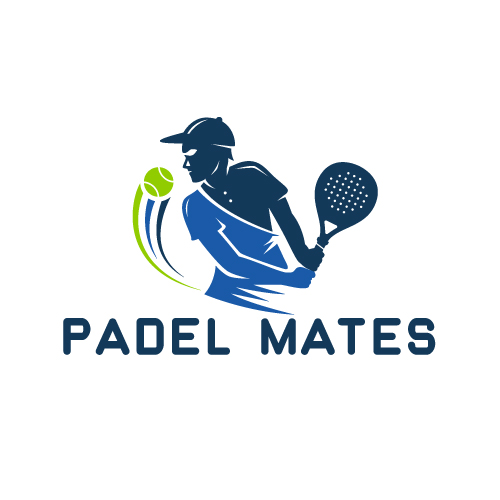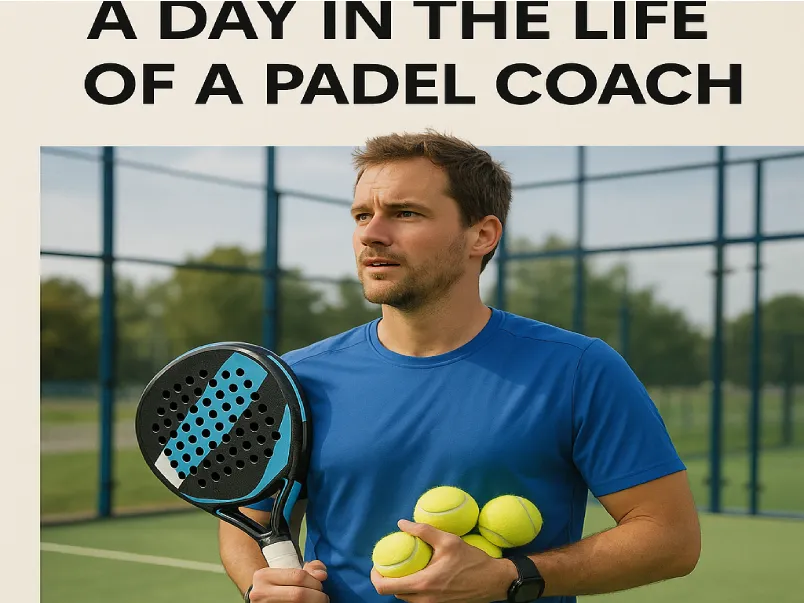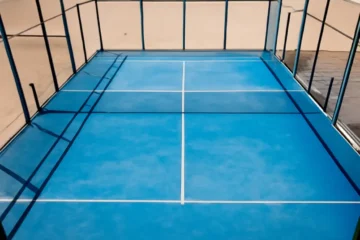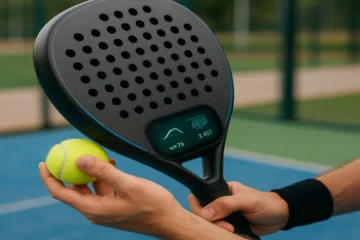The sun peeks over the horizon, casting a golden hue across the sleek, glass-walled courts of the padel club. The sound of a ball lightly tapping against the ground echoes through the morning air. This is the world of Carlos, a dedicated padel coach whose life is as dynamic as the game itself. It’s a life filled with strategy, sweat, and the profound satisfaction of seeing his students improve, one shot at a time. But beyond the courts, Carlos wears many hats: mentor, motivator, strategist, and sometimes, even a therapist. Have you ever wondered what it’s really like to live and breathe padel?
Part 1: The Morning Hustle – Strategy and Sweat
Scene Setter: The Quiet of the Early Morning, Dew on the Glass Walls
It’s early, and the padel courts are still calm, bathed in the soft glow of the morning sun. The dew on the glass walls sparkles as the first players trickle in, their footsteps light as they prepare for a day of coaching ahead. For Carlos, the day begins long before the first session starts. A padel coach’s life is not simply about hitting balls and giving advice—it’s a well-oiled system of preparation, both mentally and physically.
The Planner: A Day of Focused Strategy
Carlos starts his day in the clubhouse, sipping coffee as he reviews his schedule for the day. He’s not just looking at time slots and lesson plans. He’s visualizing the different personalities he will be working with—each session will require a unique approach. Today, he has a mix of lessons: one with a pair of beginners eager to learn the ropes, and later, a tactical session with a competitive duo seeking to refine their play. For Carlos, it’s crucial to adjust his approach according to the players’ levels of experience, mindset, and goals.
First Session – The Newbies: The Joy and Frustration of Teaching Beginners
The first group of the day walks onto the court, a couple of enthusiastic newcomers. Their excitement is palpable, but so is the sense of uncertainty as they grip their paddles for the first time. Carlos knows exactly what to expect. Teaching beginners is a balance of joy and frustration. Every swing might feel awkward, and it’s easy to get discouraged when the ball doesn’t land where you want it to. But for Carlos, this is the perfect moment to be patient, to break down the fundamentals, and to celebrate the smallest victories.
He walks them through the basic shots—forehands, backhands, volleys—encouraging them to laugh at their mistakes, because in padel, as in life, it’s all about persistence. There’s always a moment of breakthrough when a beginner hits their first solid shot, and it’s here that Carlos finds his true joy—seeing that “lightbulb moment,” that spark of realization. It’s a feeling he cherishes, knowing he’s helped someone discover the joy of the game.
Key Theme: Patience and the Art of Breaking Down Complex Movements
The key to teaching beginners is simplicity. It’s about breaking down complex movements into manageable steps. Carlos emphasizes patience and consistency, allowing his students to develop their skills at their own pace, without the pressure of competition. His ability to simplify intricate techniques makes him not just a coach, but a mentor who instills confidence, one swing at a time.
Part 2: The Midday Shift – Adaptation and Analysis
Scene Setter: The Sun is High, the Court is Busy
By midday, the courts are buzzing with activity. The once-quiet area now echoes with the sound of padel balls flying back and forth, the hum of energy in the air. Carlos switches gears as he prepares for a one-on-one session with a more advanced player. These lessons are a little different—more focused, more technical, more intense.
The One-on-One: Video Analysis for Precision
In this session, Carlos pulls out his phone, ready to give his student the visual feedback they need. He’s not just giving verbal advice. He records a slow-motion video of the player’s swing, meticulously breaking down each movement. “Watch here,” he points to the screen, “this is where you lose your power. Let’s focus on refining that motion.” The power of visual feedback is immeasurable. Carlos knows that seeing oneself on camera often leads to faster improvement because the player can better understand what needs to change.
Carlos also asks questions, engaging his student in self-reflection: “How did that shot feel?” He tailors his coaching to the player’s learning style, whether they respond better to demonstrations, verbal cues, or hands-on correction. This personalized approach helps take the player from basic competency to mastering the more intricate aspects of padel.
Key Theme: Transitioning from Fundamentals to Strategy
While the morning focused on teaching the basic fundamentals, the midday sessions are about refinement. Here, Carlos shifts from building the foundation to fine-tuning the artistry and strategy of the game. It’s about taking a player’s natural ability and transforming it into something more tactical, more precise. These lessons are where players start developing their unique styles and strategies.
Part 3: The Afternoon Lull – The Unseen Work
Scene Setter: A Rare Quiet Moment in the Clubhouse
By late afternoon, the courts are quieter. This is Carlos’s time for the behind-the-scenes work. He’s not just a coach on the court; he’s also a manager, administrator, and content creator. While others may head home after their lessons, Carlos takes a moment to breathe and handle the business side of coaching.
The Administrator: The Less Glamorous Side
Carlos spends time answering emails from players, scheduling lessons for the coming weeks, and managing payments. It’s a crucial part of his role that often goes unnoticed. Behind every successful session on the court is hours of planning, communication, and organization. Carlos needs to ensure the smooth flow of the business side to continue offering excellent coaching services to his students.
The Content Creator: Engaging with the Padel Community
In the midst of all this, Carlos also makes time to edit a slow-motion video of a perfect bandeja shot, ready to post on the club’s social media. It’s not just about promoting himself—it’s about inspiring others, showcasing the beauty of the sport, and engaging the community. These small, behind-the-scenes moments are what make Carlos not just a coach but an ambassador for the sport.
Key Theme: A Coach’s Job Extends Beyond the Court Lines
The unseen work is just as important as the on-court coaching. From administrative tasks to social media engagement, these behind-the-scenes duties ensure the success of the business and the growth of the sport. Carlos’s commitment to both his students and the wider padel community is what sets him apart.
Part 4: The Evening Fire – Energy and Emotion
Scene Setter: The Floodlights are On, the Atmosphere is Electric
As the day draws to a close, the courts come alive once more. The floodlights illuminate the players on the court, and the energy is palpable. For Carlos, this is the time to bring out his full coaching prowess.
The Group Dynamo: Fun and Movement
The first evening session is with a lively group of friends, all eager to have fun. Here, Carlos shifts his focus. It’s no longer about perfect technique or mastering shots—it’s about enjoyment, movement, and fostering a love for the game. He’s not just a coach here; he’s a facilitator of fun, creating an environment where everyone feels welcome and excited to play. The session is filled with laughter, teamwork, and the kind of camaraderie that makes padel so special.
The Tactician: Focused Strategy for Doubles
His final session is with a serious competitive doubles team. Carlos’s energy shifts once again. He’s no longer focusing on broad concepts—this session is all about strategy, communication, and positioning. He’s not just coaching padel; he’s coaching the psychology of sport. He works on resilience, mental toughness, and the ability to stay calm under pressure. At this level, coaching becomes more about fostering a strong mental game than merely refining technique.
Key Theme: The Coach as a Chameleon
Carlos is more than just a coach; he’s a chameleon, adapting his energy and expertise to meet the needs of each player and group. Whether he’s leading a fun group lesson or fine-tuning the strategy of a competitive pair, his ability to adjust makes him an invaluable mentor.
Part 5: Winding Down – Reflection and the Real Reward
Scene Setter: The Courts are Dark and Silent
The day is over. The once-bustling courts are now quiet. Carlos packs his bag, reflecting on the day’s work. It’s been a long, demanding day, but the satisfaction of seeing his students improve makes it all worthwhile.
Q&A: The Heart of the Matter
- The Biggest Challenge? “It’s mental fatigue. Being ‘on’ and positive for 8 hours straight is exhausting. You have to be mentally present for each person you coach.”
- The Greatest Reward? “It’s not about creating champions; it’s about seeing someone walk off the court with a smile, feeling more confident than when they walked on. That’s what makes it all worth it.”
- One Piece of Advice for a New Player? “Don’t worry about power. Focus on placement, patience, and having fun with your partner. That’s what will make you a better player in the long run.”
Final Reflection: A Day Well Spent
As Carlos looks at the empty court, he smiles. For him, padel isn’t just a job; it’s a passion. It’s a community, a game, and a way of life. It’s about building connections, sharing experiences, and making memories that last beyond the game. And as he hears the faint echoes of a ball bouncing off the court, he knows tomorrow will bring another day of joy, challenge, and growth—both for his students and for himself.
Conclusion
Being a padel coach is more than just teaching a sport; it’s about shaping lives, fostering community, and inspiring others. Carlos’s day is a testament to the dedication, passion, and hard work that goes into this profession. Whether it’s the early mornings with beginners or the late evenings with competitive players, a coach’s life is filled with moments of joy, challenge, and growth. So, next time you step onto the court, remember the hard work that goes on behind the scenes to make that game possible.
FAQs:
- What is a typical day for a padel coach like?
A typical day for a padel coach involves early morning preparations, teaching beginners, refining advanced players’ techniques, managing administrative tasks, and posting content to engage with the community. The day is a mix of on-court coaching and off-court responsibilities, making it both physically and mentally demanding. - What are the main challenges padel coaches face?
One of the biggest challenges for padel coaches is mental fatigue. Staying “on” and maintaining a positive attitude for hours while coaching various players with different needs can be exhausting. Balancing the demands of teaching with administrative tasks is also a challenge. - How does a padel coach adjust their coaching style for different players?
A padel coach adjusts their coaching style based on the player’s skill level and learning preferences. For beginners, the focus is on building basic skills and confidence, while for more advanced players, it shifts toward refining technique, strategy, and mental resilience. - What is the most rewarding part of being a padel coach?
The most rewarding part of being a padel coach is seeing students improve and gain confidence. Whether it’s a beginner hitting their first successful shot or an advanced player mastering a complex move, the personal growth of the players brings immense satisfaction to the coach. - How important is social media for a padel coach?
Social media is an important tool for padel coaches. It helps them engage with the community, share tips, showcase their players’ successes, and attract new students. Posting content like training videos and highlights also boosts a coach’s visibility and reputation. - What advice would a padel coach give to new players?
A padel coach would advise new players to focus on placement, patience, and enjoying the game rather than worrying about power. Learning to work well with a partner and developing a consistent playing style is key to long-term improvement.




